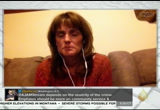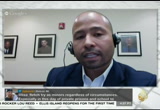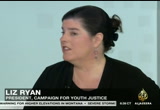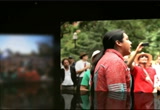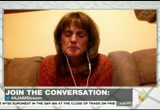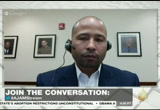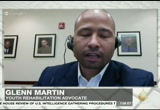tv The Stream Al Jazeera October 28, 2013 7:30pm-8:01pm EDT
7:30 pm
7:31 pm
they're not developed socially yet, adults say they committed the croi crime as adults. minors brains are not fully formed. on the flip side. facebook patrick says, they the minor should pay the same as anybody else. you can't let them off because of age. timothy brings up, there are about 2.2 million people in prison. impriimprisoning, would just, am stream as the thirst hose of the show. a child in pr massachusetts is going to be tried as an adult. >> should he face adult justice? one quarter of a million
7:32 pm
juveniles go through the adult criminal justice system each year. advocates note that juveniles who end up in prison have much higher recidivism to remain in youth facilities. victim rights advocates however argue that it's the magnitude of the crime to make it more difficult to put minors through adult courts should minors ever be treated as adults. to talk this through we are joined by liz ryan, president of the campaign for youth justice, to end the incarceration of youth for adult crimes. google hangout is glen martin who was convicted of armed robbery and served six years.
7:33 pm
a youth are advocate. welcome to all of you. liz i want to start with you. give us a snapshot of the 250,000 juveniles who go through system and how the numbers shake out. >> as you said, about a quarter of a million young people are tried in adult criminal court every single year. many of these young people are prosecuted for first time so many of them are first time offenders, many of them are charged with minor and nonviolent offenses. some people aged 16 and 17 where glen is based are automatically tried in adult court no matter what the crime is. we see a lot of situations, many of these are placed in adult jails pretrial and they haven't been convicted of anything, adult jail the most at risk for abuse and assault. many in solitary confinement
7:34 pm
before trial. >> you say many of them are in minor offenses, what would trigger a youth being tried in adult court for a minor offense? >> there are a number of states that at any age you could be prosecuted in adult criminal court for minor offenses. >> is this an an ounce of marijuana or rape with aggravating factors? >> in many states adults ages 16 and 17 can be tried in adult court for no matter what offense. stealing bag of doritos, or a bike. you can be charged with anything, in adult criminal court. kids as young as 7 can be tried in adult criminal courts depending or the offense. sometimes they range to robbery and assault and other kinds of offenses. >> jody are there circumstances under which a young person
7:35 pm
should be tried in the adult system? >> i think most definitely there are circumstances where they should be tried. obviously, i don't think it's for stealing bubble gum from the corner store. or for involuntary manslaughter. you know, i guess for murder yes, they should be charged in the adult system. for aggravated assault yes they should be charged in the adult system. >> even though you advocate for victims you see delineation between the kind of crime and the type of system the juvenile should be put into. >> yes for us, what i've been involved in is the life without parole for youth criminals. motte agree that there are cause for times where life without parole or the adult system is appropriate. there are times where a sentence
7:36 pm
in adult prison with the possibility of parole is appropriate. involuntary manslaughter, that would be an appropriate, parolable sentence. but i do think that the adult system is where they need to be. >> jody our community is tweeting in, jeremy says punishment should be appropriate for crime. everyone should have a chance to get out one day. marvin says facilitates crime by aggravating the are recidivism of this, when they get out, glen i want to get you into this conversation. should these adult prisons for minors be focused on punishment or rehabilitation pnl there is a 30% recidivism rates. what are your feelings on this?
7:37 pm
>> obviously i would argue for recidivism, disparate, system on people of color. the harsher you get in your criminal justice system, we have talked about victims in this conversation already, but let's keep in mind that communities are similarly disproportionately affected by victimization, because people tend to commit crimes in their community. and i would argue that most victims what they really want is for the perpetrator to not reoffend. and if that's what you're looking for, then you should lean towards rehabilitation. because punishment has not shown to reduce recidivism. people who return at a rate of 66% it is the one system, the one industry in the united states that has a huge failure rate and continues to operate.
7:38 pm
>> jody, is that what you think most victims want, they want the offender not to reoffend, does that constitute justice? >> i think that's a big portion of it but i think the victim's has lost a victim in many cases most cases a premeditated murder and when you come to premeditated murder i think it calls for a whole new set of standards. you know with premeditation, it takes planning, it takes foresight, it's not an act of emotion or an act of -- you know adrenalin. it is something that is planned and then executed. and i think that as a victim myself i don't know that that can truly be rehabilitated, can they gain redemption, of course. that's between them and their maker. and that doesn't have to be done as a free person. >> jody vicky here on facebook has no help for rehabilitation
7:39 pm
for the prison system, only survival at betts. i know some of the crimes committed are horrendous but vengeance, school is the best way to deter from violent crime. liz we're going oget you back into this conversation. there was a comment about reintegration, minor crimes, 14, 15 years old suppose they stay in for 15 years, ten years they want to reintegrate into society, oftentimes they're disenfrasheenfranchised and can. >> trying children in adult court is sets them up for future failure. it prevents them from reintegrating into society. living in housing going to school, all those things have been much more difficult if they have been tried in adult criminal court. we know that when young people
7:40 pm
are tried in adult court they are more likely to reoffend, recidivism is much higher. that's why the u.s. put into place a juvenile court system 100 years ago which in theory is supposed to provide rehabilitation services, it's a much better place for young people than in the adult criminal court where we know that they are going to come out with barriers facing their reentry. >> are after the break we're going to get a firsthand account of what it's like to transition from a juvenile facility to adult prison. what it's like for victims and offenders alike. stay with us.
7:42 pm
campus rape crisis. >> serial rape is the norm on college campuses. >> i know that when i did report, i was blamed. >> then this friday at nine eastern, we open up the conversation in a live town-hall event. sex crimes on campus, a special week of coverage and live town-hall on america tonight nine eastern. only on al jazeera america.
7:43 pm
>> welcome back. we're talking about whether the u.s. sentences too many juveniles in the adult system and what doing away with that option would mean for both offenders and victims. take a look at this clip, from an upcoming documentary called natural life which advocates for reform in the juvenile justice system. >> when you're real young you don't think in terms of life and death you know. you don't think of what happens next or you're just a stupid kid. you don't think about how important life is. >> i really didn't know i was in trouble. you know, i thought he was in trouble. and because you know, i was just doing what he told me to do. so even when i was sentenced and everything i still, you know kim didn't understand how they could find me guilty.
7:44 pm
>> that film was directed by tersa evan and all those featured in it were sentenced to life in prison. gear was sentenced to life in prison for a crime he committed at 18. thanks for being here. >> how you doing? >> very well. we've got a little bit of a time delay maybe a second or two between me and gary. but gary you served time in both a juvenile and adult facility. talk a little bit about your experience and the glaring differences you talked about juvenile and adult. >> i think one of the things in the juvenile justice system there was -- the atmosphere was conducive of young people to where they focused on education, inside, and as i transitioned to the prison system, it's like, it automatically became a very
7:45 pm
fearful atmosphere. and i would like for viewers to know that inside this prison setting it's like an inner city of gangs, drugs, instead of guns there's knives and weapons. and there's also law enforcement. so this environment for me was very, very dangerous, and it wasn't conducive for me in rehabilitation. so you know, that was very -- with my experience, it was very -- a difficult situation for me. >> jody you're the co-founder of a victims rights group it is called the national organization for the victims of lifers. tell me why you started this organization. >> the reason why we started this organization was back in 2006, well, for me personally i woke up on a sunday morning to a news, my sister calling me asking if i had seen the morning newspaper which the headline
7:46 pm
read, second chances for juvenile offenders or something on that order and had the pictures of the offenders in my county that were convicted of first degree murder. and sentenced to life without parole and it was talking about legislation, movement to give them a second chance. i immediately tried figuring out what that was all about and through that process i came across jennifer jenkins bishop in illinois, mage in california, and we got together as a support group and as we realized this was more of a national movement and just not in our states we decided to form novjl -- >> and jody, one of the pictures was the face of your brother's murderer, he was stabbed 25 times. >> he was stabbed 26 times and
7:47 pm
with a six inch 95 and his neck was -- he was nearly decapitated. a plop by a juvenile and her then 19-year-old boyfriend to steal a car. she wanted, i circulate say it was her plan she wanted a car to see her father in new mexico. and ultimately came up with a plan, a plan they executed and planned out. my brother had been the victim. >> our community is responding lisa and as you can imagine a lot of emotional heated divides here. saga, double starts, not old enough to vote smoke or drink. angel said if my view, if the kid can commit the crime they can do the crime.
7:48 pm
dara says make them face the victims of their crime. many are in deep denial of what they had done. video here. >> unfortunately the juvenile just system, if you transfer them to the adult system it looks worst. anxiety, posttraumatic stress disorder, you put them in a setting that's really ill equipped to deal with their needs. no training, often left in solitary confinement. >> gear you heard that comment from candace who says there are those in the community who think that we are too lenient and not worried about the victims on the flip side, the research says that youth are 36 times more likely to commit suicide in an
7:49 pm
adult facility than a juvenile facility. what's your response to the critics? >> as far as youth are concerned or young men who entered into the prison population, it doesn't seem too lenient for me, i'm at a maximum security prison where the chances of violence are taking place or you have it to you, defend yourself is extremely hard. in those kinds of settings it is extremely challenging. i will not say it is too leeb yent but i will recognize those who have been harmed and use violence that i think we as a people once we take responsibility for our actions and become accountable, then sky is the limit as far as rehabilitation is concerned. if we can reach that point i believe that all young prisoners can be redeemable. >> can i glump here?
7:50 pm
>> sure, go ahead glefn. >> obviously with all due respect to jody's story that was a pretty heinous crime. the truth is if we craft criminal justice policy with the one size fits all no room for creativity no room for rehabilitation doesn't rely on the research and doesn't give policy makers do any kind of neurobiological research suggests that young people hes able to regulate their behavior, that they're more sensitive to external influences and less able to make judgments requiring future orientation, so if we know that's what the research says and that the people don't really reach adulthood to the age of 20 or mid 20s, we should be crafting our criminal justice policy based on the science and the facts and not
7:51 pm
upon the statistics clearly not an emotional crime. >> jody you do have -- >> yes, i'm still being retraumatized by the murder of my brother through legislation, through second chance registrations, through -- legislation, let's give them a second chance, my teen aged children who never met their uncle are forced to relive this heinous heinous thing that happened to him. what i would like to say is there's this whole movement of you know they're not old enough to understand or their brains aren't developed. if that were the case then we would see all teenagers faced with the same situations, doing the same things, acting out in violence. you don't see that. i think that there are a few and
7:52 pm
i think any -- everybody can agree with me that there are some no matter what their age that are just too dangerous to walk amongst with us. i think everybody can agree with that. there are some people that just are too violence and should not have the freedoms that you and i do. >> are the. well, if you're wondering where your state stands on the issue of miles an hour and adult prisons, stick around. we're going otake a look at that but first, here are a few more stories that we're watching.
7:54 pm
7:55 pm
follow suit. lifliz how are states approachig this issue? >> a lot of states have made it harder to put kids in criminal courts. the research shows when you try kids in adult criminal courts, they are liable to reoffend. they are capable of rehabilitation and can respond well when they are in a rehabilitative environment like juvenile justice systems. >> how about kip kinkles who open fire? >> not so much with the offense as it does with the young person and their maturity and their ability to respond to rehabilitative services and
7:56 pm
treatment. we know when young people are held in juvenile justice systems they are less likely to reoffend and more likely to become successful and productive adults. >> our community actually has of course a lot of tweets. mica says that i don't think juveniles should be incarcerated at all. nick agrees, there should be recognition that treatment may not always be possible. age becomes irrelevant after 16. the united states spends with $6 billion on juvenile corrections each year. what strategies might be as effective and efficient when it comes to rehabilitation and treatment? >> not only do we spend $6 billion on youth rehabilitation we spend $80 billion on adult rehabilitation. tough on crime also means being tough on budgets essentially. one thing when i think about
7:57 pm
folks and i hear all this conversation about second chance the truth of the matter is that many people end up in the criminal justice system often haven't had a first chance. drug use alcohol use, mental health issues, impacted by trauma. all research is that hurt people, hurt people. what we have learned with the 4,000 per year that walk through agency is if you can meet the people with the services to meet their needs you have a much better chance of outcomes than the criminal justice system. state place to live, education, do what works to reduce recidivism. >> jody i would like you to jump in here. >> i would like to say when we are talking about the budget and our spending, we do spend a lot of money on correction system. but we also need to think about, what do we put into prevention?
7:58 pm
we have advocates that have been spending billions upon billions of dollars to lessen the sentence for juveniles to either not allow life without parole, not send them to the juvenile system but zero, zero money has been put into preventing these children from make these -- doing these crimes. and i want to also say that you know, this isn't a one-size-fits-all and you're talking about many of them weren't given a first chance. i think med of them are. the problem is once you're in trouble as a juvenile your record is then sealed. many, many cases at least here in michigan that i've looked into, the juvenile did have a prior record at some point in time but it was never when brought up to the adult court it was never allowed to go to the adult court, it was never allowed to say this person was you know sentenced in juvenile court because he was part of an
7:59 pm
armed robbery or he was part of you know, of assault over here. >> right. >> that's not brought into the adult system so they have been. but i think their money needs to be spent more on prevention then lessening the consequences for these heinous crimes. >> gary we have about 30 seconds left in the show. what do people on both sides need to understand here? looks like we do not have gary's audio? so lifs wh liz why don't you pik up. >> i vote for rehabilitation. >> thank you all for a really insightful discussion. we'll see you tomorrow.
8:00 pm
>> good evening everyone, welcome to al jazeera america. i'm john siegenthaler in new york. white house questions what president obama knew about tapping the german chancellor's telephone and european representatives in washington demanding answers about america's spy program. a judge strikes down parts of a controversial state law. surviving superstorm sandy. the cost to open ellis island and the new protection to prevent disaster from a similar storm.
150 Views
Uploaded by TV Archive on

 Live Music Archive
Live Music Archive Librivox Free Audio
Librivox Free Audio Metropolitan Museum
Metropolitan Museum Cleveland Museum of Art
Cleveland Museum of Art Internet Arcade
Internet Arcade Console Living Room
Console Living Room Books to Borrow
Books to Borrow Open Library
Open Library TV News
TV News Understanding 9/11
Understanding 9/11





